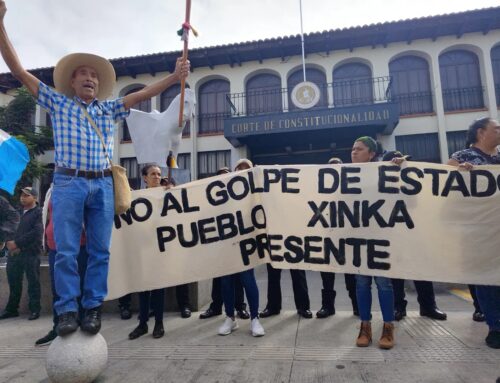On Tuesday, Guatemala’s National Forensic Science Institute (INACIF) published a report stating that former general Efraín Ríos Montt is mentally unfit to stand trial. The report was requested by Judge Carol Patricia Flores, the same judge who attempted to annul the genocide trial proceedings on April 18, 2013.
The former de facto president was convicted on May 10th, 2013 for genocide and crimes against humanity inflicted against the Maya Ixil population during Guatemala’s internal armed conflict. The Constitutional Court annulled the conviction ten days later in a controversial ruling many have deemed illegal. The first retrial date set for January 5th, 2015, was suspended before it began when Ríos Montt’s defense successful recused the lead judge Jeannette Valdés.
Now, the future of the new retrial date, set for July 23, has been thrust into question by the INACIF report. It is up to the High Risk Crimes Court “B” – the three-judge tribunal assigned to hear the case – whether or not to accept INACIF’s report that claims Ríos Montt does not have the full use of his mental faculties, is not capable of understanding the charges against him, and is unfit to stand trial.
In a July 8 statement, the Association for Justice and Reconciliation (AJR) and the Center for Human Rights Legal Action (CALDH) call into question the validity of the report and point to violations of due process. Specifically, the organizations state that Judge Carol Patricia Flores’ court does not have the judicial authority to request a report from INACIF regarding this case.
Flores temporarily brought the genocide trial to a halt in 2013 after she ruled to annul all proceedings after November 23, 2011, including her own January 2012 decision to formally indict Ríos Montt on charges of genocide. The Constitutional Court later overturned Flores’ decision, ruling that she did not have the authority to make a decision on a case that had moved on to another court.
The obstruction tactics Flores’ employed in favor the defense raised some serious alarm bells for judicial impartiality back in 2013. Now, her name has surfaced as a person of interest in an investigation led by the UN-backed International Commission Against Impunity (CIGIG) into corrupt judges. It was recommended that her judicial immunity be revoked so she could be investigated for illegal enrichment – essentially, taking bribes.
The AJR and CALDH also question the impartiality of the INACIF report, pointing to section 9.6 which states: “It is not necessary to carry out further evaluations, which would only cause a greater stress upon the life of the person being evaluated.”
Below is a section of the press release from the AJR and CALDH.
“The process is in the hands of the Sentencing Tribunal of High-Risk Crimes ‘B’ and that is the competent court to hear everything related to the case. It was this court that ruled to open the trial again on July 23, and as such, we believe the trial will continue. Once again, survivors will show that in Guatemala, there was genocide.
Both the witnesses and the victims of genocide are ready to participate in a new trial when the Guatemalan justice system shows itself capable of respecting judicial independence. The process needs to be carried out according to the law, without allowing the judicial bodies who carry out the process to succumb to the pressure of sectors interested in keeping the serious human rights violations of the past in impunity.
There already exists a condemnatory sentence for genocide and crimes against humanity, which was never annulled. It continues to be valid. This sentence reflects the truth of the Ixil people and proof that in Guatemala, genocide – a crime that holds international transcendence and is an affront to the dignity of all of humanity – happened. The State has an obligation to carry out a trial.
Once more,
#WeWillProveIt #YesThereWasGenocide
#VamosaDemostrarlo #SIHUBOGENOCIDIO
Guatemala July 8, 2015
#WeWillProveIt #YesThereWasGenocide
#VamosaDemostrarlo #SIHUBOGENOCIDIO
Guatemala July 8, 2015






Leave A Comment